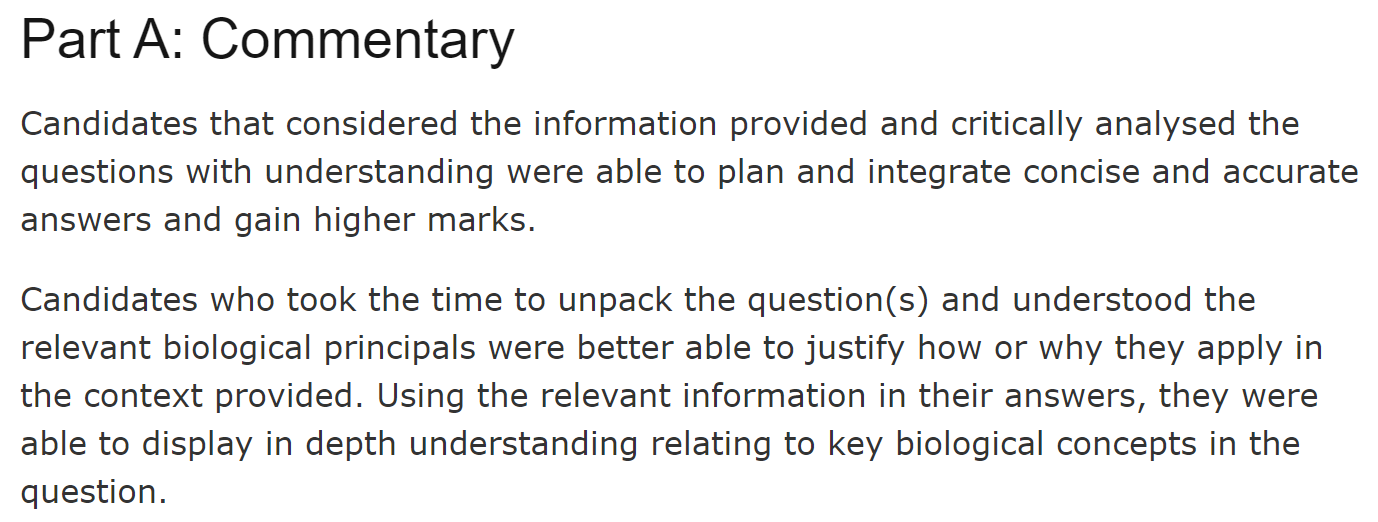This post is intended for students who are preparing for the 2023 Schol Bio exam, and discusses material covered in a tutorial meeting. One of the obvious questions is, what’s the examiner looking for?
Like the NCEA subjects. Scholarship subjects all have assessment specifications. You’ll find the Biology one here. The written exam will comprise 3 questions, requiring candidates to have a good knowledge of ecological, genetic, & evolutionary concepts; and will provide what’s often a fairly substantial amount of resource (‘stimulus’) material for candidates to use¹. That’s it. In contrast, the assessment specifications for NCEA contain more detailed statements around what students would be expected to know about various aspects of the curriculum – here are 3 L2 Biology genetics specifications, as an example.
Why the difference? The answer is that the Scholarship subjects are Performance Standards: the examiners are interested not only in what students know about their subject, but what they can do with that knowledge. Here’s the Performance Standard for Biology: let’s unpick it.
You can see that the Standard doesn’t specify the content you’ll need to cover in your answers – because thinking carefully about what to draw from your knowledge to answer the question is, in a way, part of the standard. When you come to the exam, it’s assumed that you have the necessary content knowledge from across the year 12 & 13 biology curriculum (& you’ll need to demonstrate that), but the examiner is also looking for how you do that.

Further along in the document, Explanatory Note #2 spells out what that means in practice. For example, “analysis and critical thinking involves considering the biological evidence and making well reasoned, justified² judgements.” This note also makes it clear that a successful candidate is able to select relevant biological information – from their own store of knowledge & concepts that they’ve gained in years 12 & 13, as well as from the resource material – and apply that information “to develop reasoned responses to a wide range of biological contexts³.” Responses need to be coherent, well-written, in-depth, and comprehensive.
So in preparing for Schol Bio this year, you’ll not only be extending your knowledge and understanding of biological facts and concepts, but also developing and enhancing skills related to critical thinking & analysis and communicating. This is reinforced by the introductory commentary from the examiner’s report (& also by the information on how marks are awarded in scholarship examinations, which you’ll find here):

One of the things to notice there is the examiner’s comment about planning – it really does make a difference. Planning helps to organise your ideas, for example, and that’s important if you’re going to write a coherent logical response to a question that has a good narrative flow. I’ll probably write a post about planning, later on. Another key point is their statement about critically analysing the questions themselves: you need to be clear on what they are asking you to do.
I talked about all this with a group of students last week. “So, how do we prepare?” they asked; “how do we develop these skills?” I replied that their teachers would be able to give them good advice on doing that. Personally, I said, to begin with I’d suggest 2 things to start off with:
1. reading widely in biology, to extend both the breadth & depth of your knowledge – I’m not suggesting sitting down & working through a great thick book each week! But take a little time to read blog posts, short popular science articles, stories on science-focused social media pages, that sort of thing.
and 2, practicing writing. No, not writing essays; not yet! But taking a paragraph from an article, deciding on what you think is its key point or claim and writing that down, and then writing a justification for your decision (which might involve using information you already know, or material from the article itself). By way of example the 1991 paper by Tyser & Cerbin, Critical thinking exercises for introductory biology courses, includes a flow-chart showing one approach to doing this if you choose to practice by identifying & evaluating a particular claim. (This second link on the subject is really for teachers – it discusses how critical thinking can address quite complex problems as well as relatively straightforward ones.)
It’ll be good to hear how they’ve got on, when I see them again.
¹ And you definitely have to use it. This doesn’t mean, copying chunks of information across to your answer, but analysing the resource material to decide what’s relevant to a particular part of the question, & then integrating that into your response.
² That word justified is important. It means that when you provide a fact, an example, an opinion, you need also to justify it – ie to explain why it is relevant or significant to your response.
³ It’s important to realise that the contexts for each of the 3 questions in the exam are very likely to be unfamiliar to you. Don’t be thrown by that.
